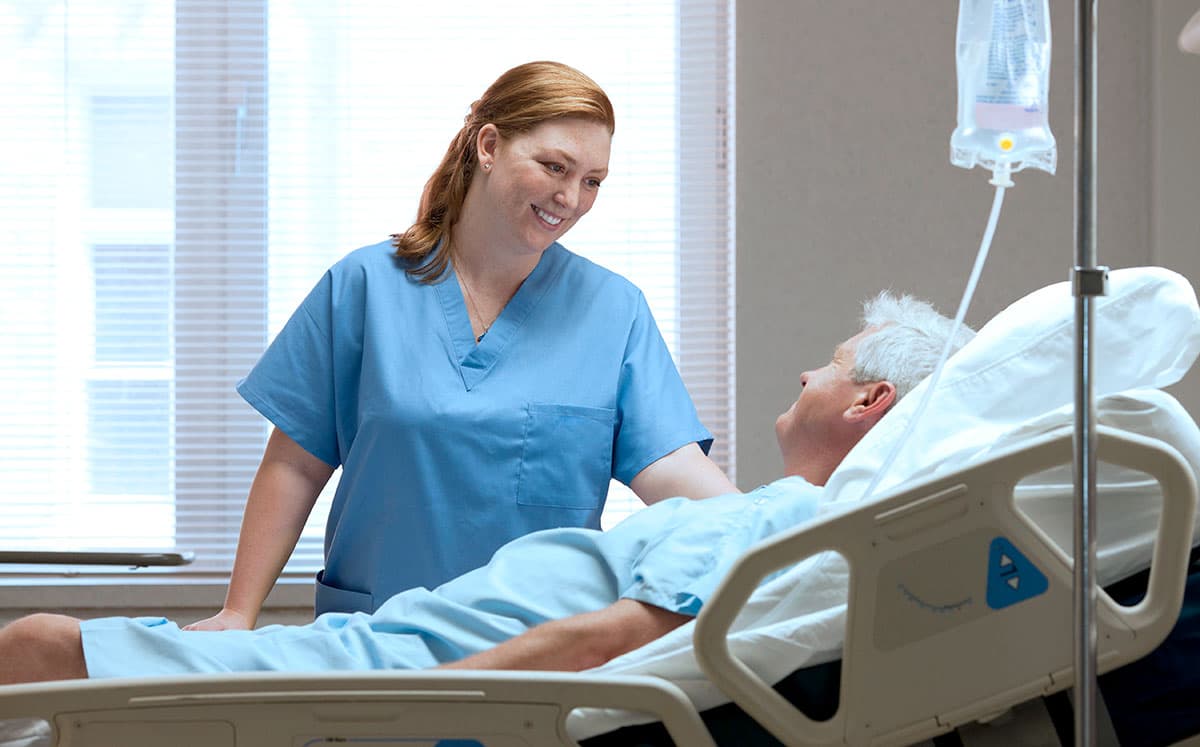
Beyond tradition: redefining FIH oncology small molecule trials with healthy volunteers
First-in-human (FIH) Phase I studies are designed to establish early safety and tolerability profiles of an Investigational Medicinal Product (IMP), with the majority of Phase I trials conducted in healthy volunteers. But oncology FIH studies typically enroll patients with cancer, for whom there is no other therapeutic option.
Are you ready to consider an alternative approach to your oncology study? The use of healthy volunteers in FIH trials with oncology small molecules may expedite clinical development and ultimately benefit patients.
Fortrea has been navigating the intricacies of FIH trials, backed by a 30-year heritage as part of Covance and Labcorp Drug Development. With an extensive oncology portfolio – and a team of about 60 oncologists – we’ve collaborated with our sponsors to investigate the pros and cons of including healthy volunteers in oncology studies. Here’s what we’ve found:

All of the news, delivered with full-text to your inbox. For professionals discovering, developing, and marketing biopharmaceutical drugs.
What conditions determine whether FIH oncology can start in HVs or cancer patients?
Deciding whether healthy volunteers or cancer patients are most suitable for an oncology FIH trial is a complex process. It involves weighing toxicology findings, a pharmacokinetics/pharmacodynamic profile, the mechanism of action, plus the cost and time requirements.
For example, a drug with genetic or epigenetic target would not be approved by the regulators to be dosed in healthy volunteers. Similarly, a drug with reported irreversible toxicology or adverse effects that cannot be readily monitored in the clinic, or compounds that must be administered would not be acceptable for healthy volunteers.
In fact, the decision will be aligned by regulatory advice and requirements. For example, there are key regulatory differences in how FIH trials are conducted when using healthy volunteers or cancer patients based on data gathered from earlier preclinical work in animal models through to the Phase I trial in humans. In particular, the clinical process is highly dependent on the earlier studies, and aspects like calculating starting clinical doses from earlier animal model data differ strongly between patients and healthy volunteers.

Patient participating in a phase I trial
Advantages of healthy volunteer recruitment:
- Rapid subject accrual: It’s much quicker and easier to recruit healthy volunteers in the early startup of the program, takes less time compared to patients and dose escalation can proceed more rapidly. This can speed up the overall progress of the Phase 1 trial and ultimately the entire clinical development program. This efficiency can also help reduce trial costs.
- Accelerated timelines of the clinical development program: In healthy volunteers, the minimum data required for dose escalation review are determined on the half-life of the compound, which can be relatively short for small molecules. In contrast, dose escalation for trials with cancer patients requires a review of the safety data from all patients of the cohort up to the completion of the last day of cycle 1 to determine whether a dose-limiting toxicity was encountered plus the review of the pharmacokinetic and pharmacodynamic available data. Each cohort cycle can last up to three to four weeks in trials with cancer patients, meaning that the safety review process can slow down the clinical development program.
- Limit unnecessary exposure of cancer patients to low, subtherapeutic doses: During early dose escalation, cancer patients will receive subtherapeutic doses, which may pose ethical concerns at the early first doses. In contrast, administering subtherapeutic doses with oncology drugs to healthy volunteers if the nonclinical package allows, is permissible, meaning that cancer patients can be allocated to higher doses, which may offer increasing benefit to them.
- Evaluation of the safety and PK profile in the absence of comorbid conditions and concomitant medications: When testing in cancer patients, the safety and PK/PD profile of the drug might be affected by factors such as comorbidities and interactions with drugs that the patient is taking. While these data are important for future stages of the trial, it might introduce confounding factors when evaluating the safety of the therapeutic in humans for the first time.
- Integration of single-dose clinical studies: Testing in human volunteers also allows early assessment of aspects like food-effect, drug-drug interactions as well as impact of the age, gender and ethnicity on the PK of the drug. It can be easier to test these interactions in healthy volunteers than in cancer patients due to potential confounding factors such as drug-drug interactions. These data can help guide dose adjustment and dosing regimen in larger-scale future trials.
Disadvantages of healthy volunteer recruitment:
- Absence of pathology in the healthy tissue: Obviously, the drug target in the tumor is not present in most healthy tissue; therefore, PD and efficacy cannot be monitored at the first dose levels. Testing in healthy volunteers can thus provide only an indication of effectiveness in cancer patients for some drugs if the target is present. So, the advantage of including cancer patients is that tumor biopsies can be taken to monitor PD effects, however this is a substantial burden and risk to patients so biopsies sampling should be limited.
- Uncertainty about translatability of PK and PD findings to cancer patients: There could also be differences in the PK profile of a small molecule drug in cancer patients versus healthy volunteers, which largely depends on the different expression levels of the drug target in healthy and tumor tissue underlying medical conditions in cancer patients. For example, many cancer patients might have altered hepatic metabolic function due to liver malignancies or hepatotoxicity from previously administered chemotherapies. (e.g., the antimetabolite fluorodeoxyuridine). As such, the liver metabolism of the drug and active metabolites might differ between healthy volunteers and cancer patients. Thus, dose adjustments in the patient population might be needed for drugs tested in healthy volunteers, considering side effects and efficacy variability in cancer patients.
- Risk of unexpected serious side effects, which may lead to life-threatening or long-term adverse effects: As with any other new investigational drug, some oncology small molecule drugs have adverse toxicology effects that are too risky and potentially life-threatening for testing on healthy volunteers. For healthy volunteers who stand to gain no benefit from the treatment, the threshold of acceptable risk is lower than it is for cancer patients. Dosage escalation and testing will therefore be less extensive than in cancer patients.
Weighing the decision
Ultimately, the choice of whether to start an FIH clinical trial for oncology small molecule drugs in healthy volunteers or cancer patients depends on a wide range of aspects, but the preclinical package and the mechanism of action are the key decision drivers. Each study must be judged on a case-by-case basis, as no “one size fits all” approach exists to define healthy volunteers as a population for a FIH oncology trial. Benefits and risks need to be balanced and all the stakeholders involved (sponsor, regulators, investigators, even CROs) must determine the most appropriate approach.
Ready to explore this option? With more than 1,200 oncology trials in the last five years (almost 600 of which were either Phase I or Phase I-II), our team at Fortrea is a collaborative, experienced partner for your FIH studies.
LEARN MORE at fortrea.com
AUTHOR INFORMATION

Begoña de las Heras, MD
Begoña de las Heras, MD, is Senior Medical Director in Oncology based in Madrid, Spain. Dr. de las Heras has more than 23 years of national and international clinical/clinical research oncology experience including the pharmaceutical and CRO industry, focused on planning and execution of global oncology clinical development from FIH to registration. Dr. de las Heras’ main area of expertise is the development of early phase oncology programs. She has provided significant contribution to INDs, orphan drug applications and one NDA submission. She has authored/co-authored multiple papers and book chapters in oncology and is named as inventor of two patent applications. Dr. de las Heras earned her medical degree from the University Autonoma of Madrid and completed her oncology residence at La Paz Hospital in Madrid.